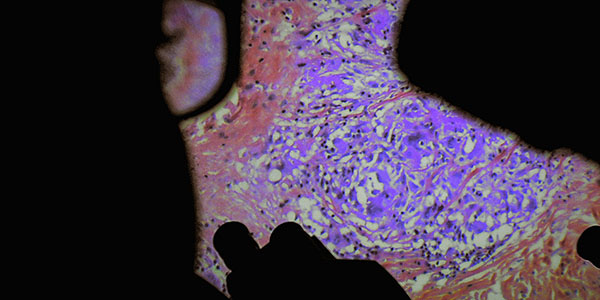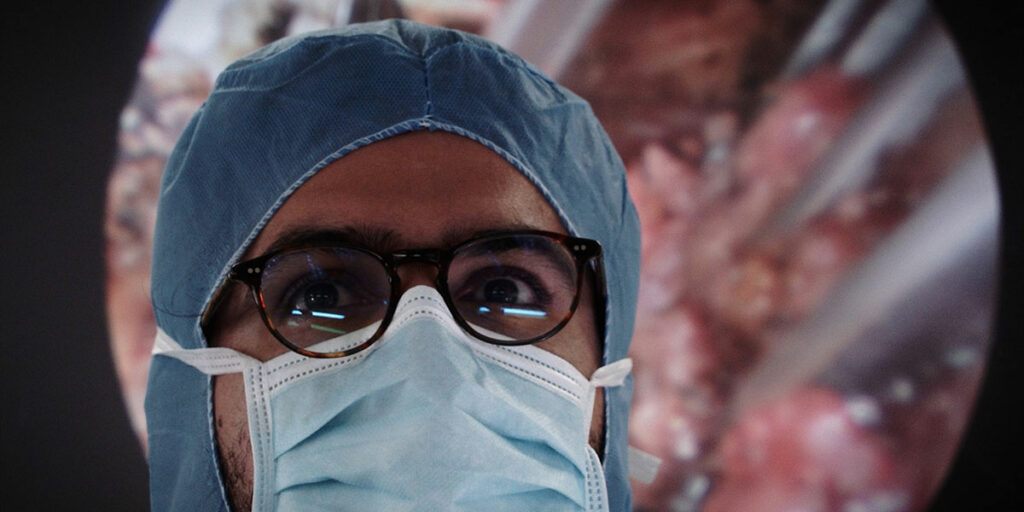Lucien Castaing-Taylor and Véréna Paravel’s De Humani Corporis Fabrica unflinchingly captures the inner workings of the human body through mesmerizing and provocative images.
Although David Cronenberg’s latest feature, Crimes of the Future, had some stirring imagery, this year’s top shock factor producer was caused by another film, Lucien Castaing-Taylor and Véréna Paravel’s outstanding and unique documentary, De Humani Corporis Fabrica, named after the 16th-century studies on human anatomy by Andreas Vesalius. After boarding a hulking fishing vessel coursing the New England coast in Leviathan (2012) and exploring the discomforting significance of cannibalism in human existence with Caniba (2017), which received many accusations due to its “dreadful” portrayal, the documentary filmmaking duo of Castaing-Taylor and Paravel decided to investigate the innards of the human body. They open it to a cinematic proportion, a remarkably uncomfortable (in a good way) experience like no other. Arriving with the tagline “the human body as you have never seen it before”, De Humani Corporis Fabrica reveals the extraordinary landscape that exists within the human flesh and the advancement of how society treats complex medical conditions and diseases in this day and age.
I was excited to see this film just by glimpsing through a couple of preview images. The pictures looked provocative and intriguing, as hospitals are often juxtapositions of their own – places of both suffering and hope. It is also a coincidence that a film that remarked “surgery is the new sex” premiered at the same festival as this documentary, since it showcases various ways in which the body can be repaired and recuperated through different ailments. However, it doesn’t only tackle the body and all its wonders; De Humani Corporis Fabrica also presents the people behind the operations – the overseers and architects of the bodily repairments. Castaing-Taylor and Paravel have always had a fascination with uncanny and captivating methods of crafting their projects. Their latest explores the human vessel and its fixers – the surgeons and doctors – through closeup shots of organs, muscles, and other body parts captured via cameras inserted into the patients for treatment purposes and from above the operating table.
From C-sections and dissected breasts to open back surgeries, all of which leave your jaw on the floor, the doc puts the audience’s face first onto the mechanisms behind these various procedures. It is not for the faint of heart, but it’s provocative and immensely interesting in high regard. That’s why it is mesmerizing and uncomfortable at the same time because you are seeing the real thing in a way that hasn’t been captured before. It unflinchingly demonstrates the inner working of hospitals around Paris and how they treat the human body when it breaks. It takes a toll on you as it keeps going, because it is so vivid and pulsing that the images stay with you hours after watching it. You begin to ponder about how the body works (and its beauty), the advancements of technology, our fractured healthcare, and life itself and the toll of time. The directors want to represent that not only is our body a work of sheer wonder, but that the people whose job it is to repair and care for us are also miracle workers by themselves.

It’s an ode to those who are dealing with life and death on a daily basis, “comically” represented during the film’s closing moments, where we see a farewell party for one of the staff members. As we hear their respective conversations to ease the tension – talking smack about the other departments, berating the students assisting them, venting about their frustrations – we, the audience, learn to understand their worries. Heck, they are some of the most important people in the world. Through these intersections of conversations and imagery, one begins to comprehend their extremely tough duties. Although Castaing-Taylor and Paravel might have received plenty of comments for their provocations in Caniba, here they are justified because of the film’s deliberate exposition on its topics. In a way, this is a documentary about fragility, both of our own bodies and of the people performing surgeries on them. Our bodies could break for whatever reason, and we go to these overworked doctors and surgeons to find the cause of why it’s tearing and keep us alive.
The directors don’t shy away from showing you how these procedures are done and how they look inside and out. This type of film makes us question the limits of what a documentary can be. The conventions of what it may contain or how deep it may explore its respective subjects and topics are tested each time the duo concocts another project. This is a far new cinematic experience crafted by Lucien Castaing-Taylor and Véréna Paravel, which is hard to replicate. As you learn about human biology through its 118-minute runtime, you also ponder about your perception of what’s being shown. Your perception might change or might stay the same, but, at the end of the day, you’ll reflect on existence (and the insignificance of it) and the importance of these hospital workers. De Humani Corporis Fabrica is as shocking as a horror picture and as palpable as seeing the real thing in person, a true achievement in documentary filmmaking, and a riveting watch that also discomforts.
De Humani Corporis Fabrica premiered at TIFF on September 9, 2022.

